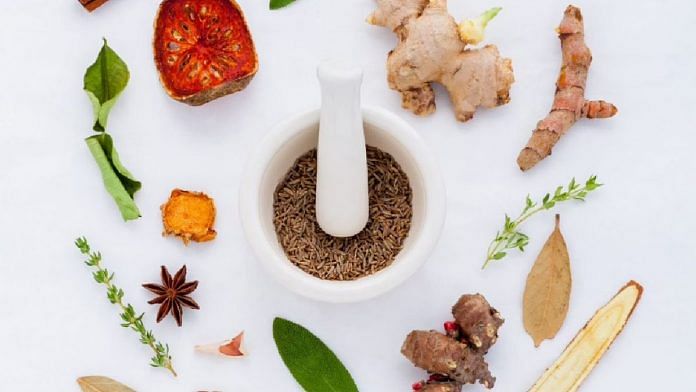New Delhi: Can modern and traditional forms of medicines be married together to treat diseases such as dengue, liver disorders, multiple sclerosis, and even cancer? That’s just what the Indian Council of Medical Research (ICMR) and the Union Ministry of Ayush intend to find out.
According to a government document released on 10 October, ICMR — India’s apex body for the formulation, coordination, and promotion of biomedical research — and the Ministry of Ayush have identified nearly 30 “priority” diseases for which they want to find curative as well as preventive solutions by integrating the two systems of medicine.
The document calls for research proposals for the exercise, which will be undertaken by the proposed Ayush-ICMR Advanced Centre for Integrative Health Research (AI-ACIHR). These centers, to be set up at the All India Institutes of Medical Sciences (AIIMS), are aimed at “promoting high impact research on Integrative Health to generate evidence in priority areas of national importance in healthcare utilizing modern scientific methods”.
Traditional forms of medicine include Ayurveda, Homeopathy, Unani, and Siddha.
ThePrint reached ICMR’s Director General Dr Rajiv Bahl over calls and text messages but had not received a response by the time of publication. This report will be updated if and when a response is received.
The project, however, has received mixed responses. Some experts like Tanuja Nesari, the director and head of the division of Translational Research & Biostatic at Delhi’s All India Institute of Ayurveda, believe integrated medicine is the “future of healthcare”.
“If we generate evidence on the efficiency of traditional medicine using tools of modern science, traditional medicine will gain better acceptance among masses, modern doctors as well as at the global level,” she told ThePrint.
But others are more skeptical of the move.
Dr. Cyriac Abby Philips, a hepatologist and clinical researcher from Kerala known on social media for his critical views of Ayurveda and other forms of traditional medicine, believes integrative medicine “is a sorry excuse when realistic, scientifically validated right to all healthcare cannot be provided to the citizens by the government”.
“There should be no point in wasting crores of rupees in wasteful schemes that regrettably embrace pseudoscientific principles with scientific projects,” he told ThePrint.
“Integrative healthcare does not rely on a rational hypothesis, is meddled with untestable premises, and has no potential for identification of logical solutions in communicable or non-communicable diseases apart from creating more financial burden on an already constrained resource setting and patient population.”
Also Read: Haryana’s one-year ayurveda study plan under MBBS can’t be executed, say medical experts
Scope of project & priority diseases
The document released by the ICMR said that the broad scope of the project is to develop integrative health research through marrying the Ayush system with conventional bio-medicine, and modern technology for improved patient outcomes.
The document calls for submissions by 29 February 2024.
The objective, it says, is to harness the mutual understanding and research environment between the different systems of medicine leading to integrative health research, identifying gaps in knowledge and priority areas where the approach may have potential, and generating robust evidence.
The document proposes setting up AI-ACIHR under ICMR’s Extramural Research Programme, under which the institution provides financial assistance to Indian scientists working in the areas of medicine and public health.
“There is a need for an integrated healthcare regime that can guide health policies and programs in the future,” it says, adding that India “has an advantage in this global resurgence of interest as it has a rich heritage of indigenous medical knowledge coupled with a robust infrastructure and skilled workforce in contemporary medicine”.
It goes on to say that earlier this year, a memorandum of agreement (MOA) was signed between the Ministry of Ayush and ICMR at an inter-ministerial level “to promote high-impact research on integrative health to generate evidence in priority areas of national importance in healthcare utilising modern scientific methods”.
The aim, according to the document, is also to develop integrative management protocols “with inputs from both traditional and modern medicine for the identified diseases based on the generated evidence apart from carrying out mechanistic studies to explain the approach”.
“Joint efforts will be in place to conduct high-quality clinical trials on identified areas/disease conditions of national importance with promising integrative therapies to generate evidence for wider acceptance,” it adds.
The priority diseases have been divided into four categories: communicable and non-communicable, reproductive, maternal and child health and nutrition, and autoimmune diseases.
The ailments that will be covered under the project include tuberculosis, vector-borne diseases, chronic respiratory diseases, mental health issues, childhood malnutrition including stunting, wasting and obesity, rheumatoid arthritis, psoriasis, cancer, and multiple sclerosis, among others.
‘Defund alternative medicine practices’
Dr. Cyriac Abby Philips, quoted earlier, believes no scientifically progressive society or nation “would ever endorse or spend public funds to promote and realise integrative healthcare solutions to combat communicable or non-communicable diseases”.
“Integrative healthcare is not the solution, it will become a problem in the future,” he said.
“The right way forward is to defund alternative medicine practices and siphon those funds into improving basic and clinical research infrastructure, provide adequate remuneration for basic and clinical scientists, and improve research output by focusing on core areas of public health.”
Instead, he believes state-of-the-art research in identifying and modulating novel targets in cancers of children and adults and funding genomic and microbiome studies that will help identify breakthroughs and change clinical medical practice is the need of the hour.
According to him, in its true form, integrative healthcare is a “marriage of what works and what does not work and provides undeserving credit to that which does not work”.
“If we mix apple juice with urine, the urine does not get better, but the apple juice gets worse,” he told ThePrint.
(Edited by Uttara Ramaswamy)
Also Read: Ayush admissions ‘scam’ in UP sees officials suspended, action likely against hundreds of students



